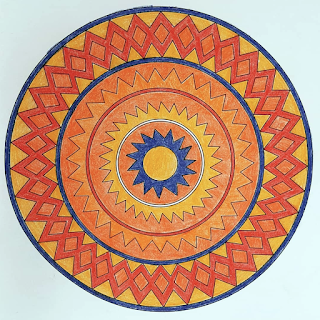5 reasons we need the arts in education
My summer
holidays are coming to an end and I’m gearing up for another year in the
classroom. It’s important to come in with high energy and enthusiasm in order to
hook students into a new year of learning. This can be tricky, though, as not
all kids like art or see the value in doing it (you know, like ‘this is
pointless, it’s not like I’m going to be an artist’). In a world that seems to value
money and power over all, it can be hard to instil the importance of art into
teenagers, but I try.
Here’s my
take on why the arts is a vital part of education and the greater society in our
rapidly changing world.
1) It encourages play!
How many school kids (especially high
schoolers) do you know that would tell you ‘school’ is synonymous with ‘play’? Not
many, I bet. Instead, words such as ‘routine’, ‘tests’ and ‘rules’ come to mind
for many. Play has been recognized as important for healthy brain development,
and fosters creativity while developing one’s imagination, dexterity, and
physical, cognitive and emotional strength. As adults, we allow this play time
for young children but it diminishes as our children grow older and school work
becomes more analytical or conceptual. I recognize that this is important, however,
we should not diminish play as we get older. The arts classroom is perfect for
giving learning experiences through play and free exploration.
2) It reduces stress
 Art therapy and adult coloring books are becoming
increasingly popular, and it has long been agreed that creative activities alleviate
stress. But why? Well, it has a lot to do with balancing our lifestyles. ‘Self-care’
is a bit of a buzz word these days and spending regular time on your hobby is
seen as essential for a healthy and balanced lifestyle. Studies have found that
drawing and coloring in particular can minimize anxiety and negative thoughts. Any
act of creation brings us to the present moment and serves as a distraction to our
problems of daily life. This meditative state or ‘flow’ relaxes us and gives our
overactive minds a break.
Art therapy and adult coloring books are becoming
increasingly popular, and it has long been agreed that creative activities alleviate
stress. But why? Well, it has a lot to do with balancing our lifestyles. ‘Self-care’
is a bit of a buzz word these days and spending regular time on your hobby is
seen as essential for a healthy and balanced lifestyle. Studies have found that
drawing and coloring in particular can minimize anxiety and negative thoughts. Any
act of creation brings us to the present moment and serves as a distraction to our
problems of daily life. This meditative state or ‘flow’ relaxes us and gives our
overactive minds a break.
3) It fosters curiosity
All children are born with natural curiosity, but it can be lost if it not
continually cultivated over time. The arts have a lot in common with science as
we both conduct investigations and experiments. Both the artist and scientist ask,
‘what happens when…?’ and ‘what might work better?’ They then perform practical
experiments to find out. The arts, particularly the element of play, encourages
this natural inquisitiveness and promotes self-learning.
4) It offers a platform for
self-expression
The arts in all its forms are about communication. This may be obvious,
but not everyone is comfortable or able to express themselves in the conventional
forms of discussion. Music, dance, drama and pictures not only communicate
information and concepts but also emotion.
This is the language of the arts, and
in a world that often discourages bold displays of emotion, the arts give us a
safe place to explore and express it. We are allowed to discover who we are and
how we see the world and our connection with it.
Which brings me to….
5) It brings about diversity.
The arts help us to understand who we are, but just as importantly, it
helps us understand other people and other cultures. The arts can open a
dialogue on sensitive issues and encourage people to take different perspectives.
Our world often feels divided, but the arts can unify us in celebration of
diversity. I firmly believe the arts is needed more now than ever to bring to
help our society progress and bring about social change.
As you can
see, the arts are not just about creativity. Every one of us is different and
will learn and gain different things from participating in the arts. If you’ve
lost touch with your own creative pursuits, I urge you to carve out some time for
it – just a wee bit can bring great benefits.
Until next
time,
Erin
Further
reading and references:


Comments
Post a Comment